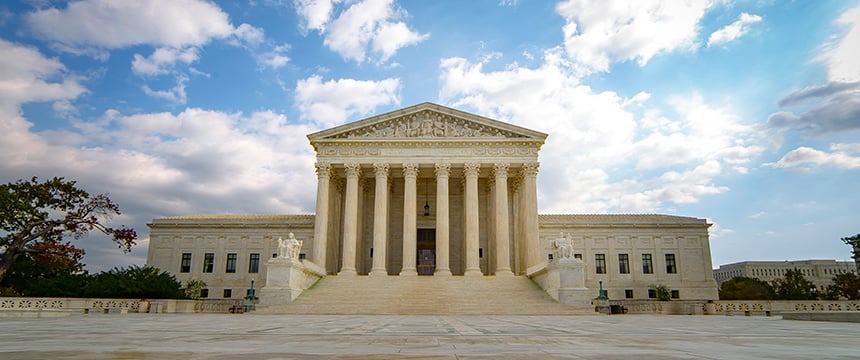Master of Its Choice of Forum?
Supreme Court to Decide if a Plaintiff May Compel Remand of a Removed Case by Voluntarily Dismissing Its Federal Claims

On April 29, 2024, the U.S. Supreme Court agreed to review whether a plaintiff may compel the remand of a case removed on the basis of federal question jurisdiction by voluntarily amending its complaint to leave only state law claims. Royal Canin U.S.A., Inc. v. Wullschleger, No. 23-677, 2024 WL 1839095 (U.S. Apr. 29, 2024).
The Royal Canin case is a class action. Last year, the Eighth Circuit held that “amending a complaint to eliminate the only federal questions destroys subject-matter jurisdiction.” Wullschleger v. Royal Canin U.S.A., Inc., 75 F.4th 918 (8th Cir. 2023). In seeking Supreme Court review, the Defendants argued that the decision “runs roughshod over a defendant’s statutory right to remove” and “departs from all other circuits.”
The Royal Canin case therefore presents an issue of significant interest to class action practitioners — and to all who practice in the federal courts.
The Complaint
In February 2019, two Missourians sued Royal Canin and Nestlé Purina PetCare Co. in state court. They alleged that those pet food manufacturers misled pet owners to believe that purchases of the manufacturers’ “prescription pet food” required prescriptions by law, and to obtain prescriptions and pay “premium” prices for the food. The Plaintiffs alleged violations of Missouri antitrust law and the state Merchandising Practices Act, as well as asserted unjust enrichment claims. They sought to represent classes of Missouri citizens.
Nestlé Purina removed the litigation to the U.S. District Court as presenting federal questions requiring interpretation of the federal Food, Drug, and Cosmetic Act and an FDA Policy Guide, as well as pursuant to the Class Action Fairness Act (CAFA).
In June 2019, the District Court remanded the litigation, holding that the plaintiffs’ claims did not raise questions of federal law and that no “minimal diversity” existed for a CAFA removal because Nestlé Purina and Royal Canin were citizens of Missouri. The Eighth Circuit granted review solely as to federal question jurisdiction, later holding that such jurisdiction existed, vacating the District Court’s order.
The Amended Complaint
In November 2020, the Plaintiffs filed an Amended Complaint, asserting only state law claims for alleged merchandising practices act violations and conspiracy, eliminating most references to federal law. The District Court declined to remand the lawsuit, holding that federal question jurisdiction attached to the conspiracy claim because the Plaintiffs contended that they were misled to believe that federal law required prescriptions. The District Court later dismissed the Complaint on substantive grounds, resulting in the Plaintiffs’ appeal to the Eighth Circuit.
The Eighth Circuit Decision
On appeal, the Eighth Circuit asked the parties to submit supplemental briefing on whether federal jurisdiction existed in light of the Plaintiffs’ amendment. In July 2023, the Eighth Circuit issued an opinion holding that neither the retooled merchandising practices act claim nor the conspiracy claim presented a federal question. The court then held that federal jurisdiction was absent, even though such jurisdiction existed when the case was removed. The court cited a 1926 Eighth Circuit decision providing that, when a plaintiff voluntarily changes his pleading to eliminate federal jurisdiction, it “becomes the duty of the court to remand the case, if it be a removed case.” The court further held that “the possibility of supplemental jurisdiction vanished right alongside the once-present federal questions.”
The Petition for a Writ of Certiorari
In their Petition, the manufacturers argued that the Eighth Circuit decision “entitles plaintiffs to engage in a new form of federal-state forum shopping,” contrary to decisions of “every other circuit.” The Petition cited decisions from the Third, Ninth, and Eleventh Circuits that federal jurisdiction cannot be eliminated in a removed case by a plaintiff’s voluntary deletion of federal claims, as well as decisions from the First, Fourth, and Sixth Circuits that a district court may elect to exercise supplemental jurisdiction in such circumstances. The Petition also cited a 2009 Eighth Circuit decision with the same holdings — a decision that the Eighth Circuit expressly declined to follow in favor of its 1926 decision. The manufacturers argued that the appellate court’s decision granted plaintiffs in the Eighth Circuit “a mulligan after a failed attempt to remand a case” “that burdens both the state and federal court with start-and-stop litigation.”
The Plaintiffs responded by arguing that if there are no other independent grounds for federal jurisdiction, no independent federal jurisdiction exists in a removed case once all federal questions are dismissed, such that “any jurisdiction that continues over the remaining state-law claims is supplemental jurisdiction.” They also argued that supplemental jurisdiction generally should be declined in a lawsuit’s early stages when all federal law claims “have dropped out,” and that no circumstances existed in the present litigation providing otherwise. The Plaintiffs further noted that Supreme Court precedent provides that, if a plaintiff files a case in federal court, and then voluntarily amends the complaint, “courts look to the amended complaint to determine jurisdiction.” The Plaintiffs argued that premising “the existence of federal jurisdiction in two cases with the exact same amended complaint” on where the action was first filed is not required by any jurisdictional statute.
The manufacturers replied that “a case removed to federal court implicates a defendant’s statutory right to remove, whereas a case originally filed in federal court does not.” They argued that “the law — everywhere except the Eighth Circuit now — is that federal-question jurisdiction that supported the removal is retained, notwithstanding a plaintiff’s post-removal amendment to the complaint.”
Conclusion
As the manufacturers’ petition for certiorari stated, the issue to be decided by the Supreme Court presents “a fundamental and recurring issue of federal subject-matter jurisdiction,” one of particular interest to class action practitioners — and which we will closely follow. Stay tuned.
